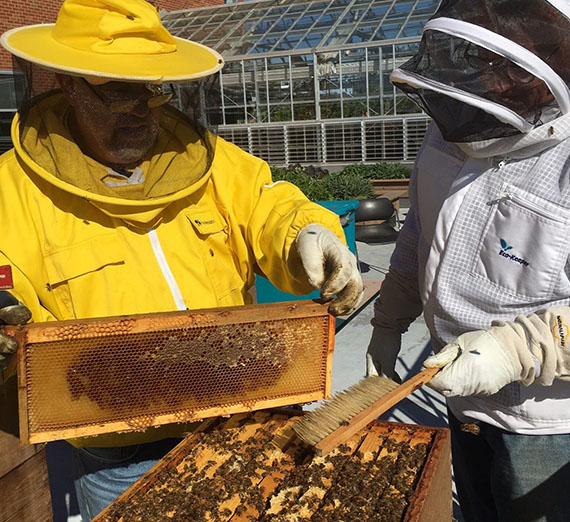Gonzaga Becomes a Certified ‘Bee Campus USA’

SPOKANE, Wash. – With two apiaries at the Hemmingson Center Roof Garden and one at Bozarth Mansion, Gonzaga University has become the 25th educational institution in the nation – and first in the state of Washington – to be a certified affiliate of the Bee Campus USA program, designed to marshal educational institutions to benefit these endangered pollinators.
“We’re very pleased to receive this Bee Campus certification,” said Gonzaga President Thayne McCulloh. “This designation demonstrates our commitment to find ways of playing a role in supporting a healthy ecosystem, one we take seriously. Our faculty, staff and students have embraced the call for us individually and collectively to be good stewards of the Earth’s resources.”
Gonzaga is the nation’s first Jesuit college or university to achieve the designation, issued April 24. The program endorses a set of commitments for creating sustainable habitats for pollinators including bees, butterflies, birds, and bats, among thousands of other species that are vital to feeding the planet.
Gonzaga harvested some 50 pounds of honey last summer from its three hives. The hives, which are rebuilding from winter, are expected to reach their maximum capacity of up to 50,000 bees each this year.
College students, faculty, administrators, and staff have long been among the nation’s most stalwart champions for sustainable environmental practices. Phyllis Stiles, director of Bee Campus USA, called Gonzaga a stellar example of the influence educational institutions can have on their students and the broader community.
“Their talented faculty, staff and students offer an invaluable resource for Eastern Washington residents in seeking ways to manage ornamental landscapes in more wildlife-friendly ways,” Stiles said.
Many species of bees, butterflies and other pollinators are in sharp decline due to factors that are primarily human-caused, including pesticide use and loss of habitat.
“Imperiled pollinators are responsible for the reproduction of ninety percent of the world’s wild plant and tree species,” Stiles said.
Chuck Faulkinberry, director of the Hemmingson Center and a certified beekeeper, said the Hemmingson Center’s Roof Garden features pollinator friendly plants including basil, borage, lavender, sunflower, thyme and oregano. Faulkinberry takes pride in the Gonzaga’s commitment to minimizing hazards to pollinators by using no neonicotinoid pesticides, and almost no glyphosate herbicide or other potentially dangerous synthetic pesticides.
Gonzaga intends to continue introducing more pollinators around campus. A Gonzaga webpage raises awareness of the plight of pollinators. The page also includes: Gonzaga’s Integrated Pest Management Plan, a list of native plants incorporated into the campus landscape (including their bloom time and habitat needs), links to student research into pollinator issues, and information about upcoming events.
The Gonzaga community is excited to use the apiaries as a living lab for research and service-learning. Faculty, staff and students have collaborated to study and create pollinator habitat with native plants. Six Gonzaga courses include pollinators in their syllabi; removing invasive species is an important student activity during these courses.
Students benefit from an active integrated learning experience, said Ellen Maccarone, Gonzaga associate professor of philosophy and faculty adviser to the president. “As a food ethicist, pollinators are an important element in our natural and social environments. I’m proud we’re now a certified Bee Campus,” Maccarone said.
To retain certification, campuses must reapply each year and report on accomplishments.
